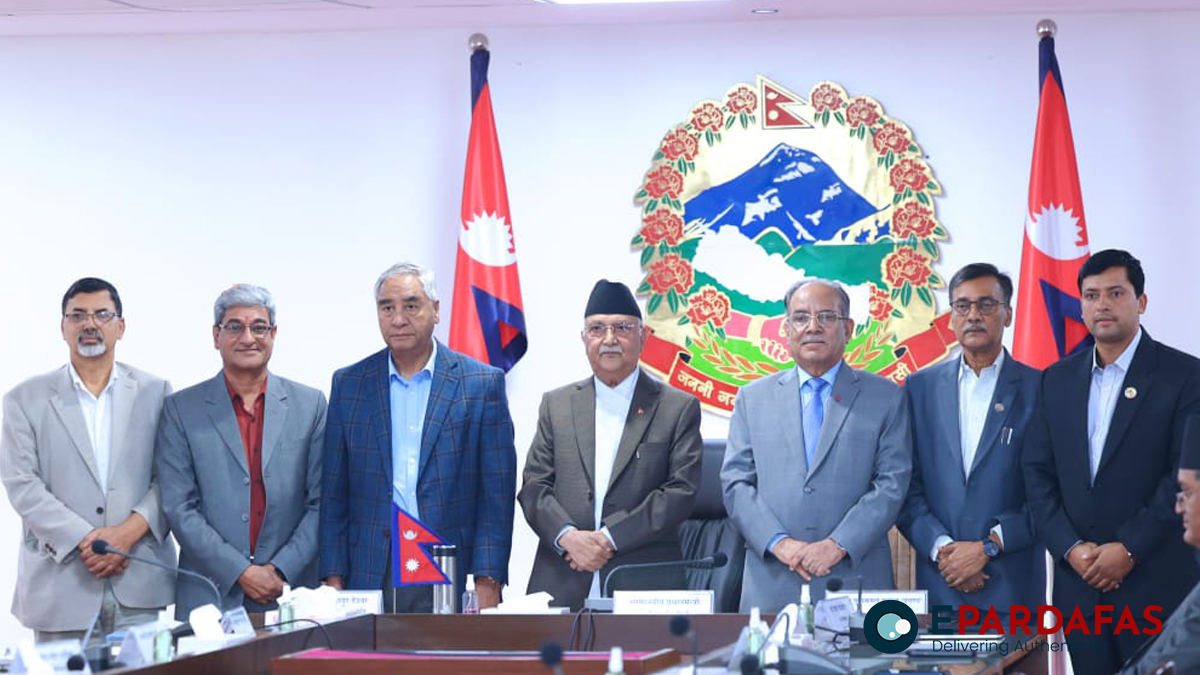
Task Force Submits Report on Transitional Justice to Nepal’s Top Leaders
A report detailing the understanding reached at the task force level to finalize transitional justice in accordance with the Comprehensive Peace Accord (CPA) has been handed over to the top leaders of Nepal’s three major political parties, including Prime Minister KP Sharma Oli.
The task force submitted the report to Prime Minister and CPN (UML) Chair Oli, Nepali Congress President Sher Bahadur Deuba, and CPN (Maoist Centre) Chair Pushpa Kamal Dahal ‘Prachanda’, during a program at the Office of the Prime Minister and Council of Ministers at Singha Durbar today.
Members of the task force – Home Minister and Nepali Congress leader Ramesh Lekhak, UML Chief Whip Mahesh Kumar Bartaula, and Maoist Centre leader Janardan Sharma – presented the report on the understanding to the top leaders.
The task force had reached an agreement on August 1 on several contentious issues, including the interpretation of conflict-era incidents, and the provision of relief, compensation, reparation, and justice to the victims.
The report handover program was attended by PM Oli, NC President Deuba, UML General-Secretary Shankar Pokhrel, PM’s Chief Political Advisor Bishnu Rimal, Attorney General Ramesh Badal, Government Chief Secretary Liladevi Gadtaula, among other officials.
The main political parties had reached a four-point understanding on settling the issue of transitional justice, which has garnered significant national and international interest.
According to the agreement, intentional or arbitrary killings will be classified as murder. Families of security personnel who lost their lives in the conflict will receive relief, compensation, and reparation, with similar provisions planned for disqualified combatants.
In cases where the victim does not consent to the conflict-era case, it will be recommended to the Attorney General. These cases will be adjudicated based on the existing principles of criminal justice, but in alignment with transitional justice.
The task force emphasized that the agreement is based on the principles of transitional justice and national and international standards, with victims’ concerns at the forefront. The Supreme Court’s decisions have also been considered. The agreement aims to ensure that the entire country benefits, rather than having one side win and another lose.
The agreement stipulates that victims and perpetrators will be brought together and integrated in a manner that prevents future conflicts. Victims will be assured justice, and perpetrators will be held accountable.
The agreement among the major political parties on this significant backlog of the peace process is seen as a measure to alleviate the conflict-era wounds. It has been 17 years since the signing of the CPA, and the major parties have finally struck a deal to fully settle the peace process.
Despite the formation of two transitional justice mechanisms and multiple appointments of officials since the CPA, progress had been stalled due to political differences. The recent agreement marks a significant step forward in finalizing Nepal’s peace process.
- Former King Gyanendra Extends Condolences Over Pahalgam Terror Attack
- Nepal Firmly Opposes Terrorism in All Forms: Foreign Minister Dr. Arzu Rana Deuba
- Protests Erupt Outside Pakistan Embassy in Kathmandu Following Terror Attack in Kashmir
- Chinese Export Factories Hit Pause Amid Tariff War Fallout, Signaling Deeper Economic Woes













Comments